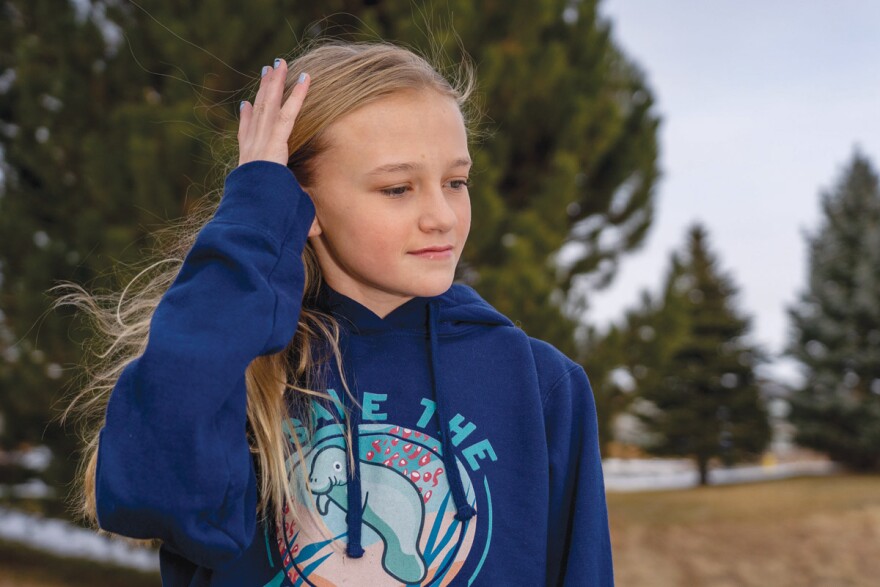In the next part of our series On Edge, we meet middle schooler Brooklyn Colbert. She's always liked going to school. Until recently. Remote learning in the age of COVID has changed things. And it's putting stress on students, educators, and parents.
Brooklynn Colbert has always enjoyed school. She’s a good student, excelling particularly in math.
But now, instead of looking forward to school, the Murphy Creek Middle School seventh grader dreads it. It’s lonely. It’s stressful. It’s grinding.
“It doesn’t exactly feel like school anymore,” Colbert said. “I’ve always liked to go to school, and now when I wake up in the morning I’m like ‘oh great, I have school.’”
Because now when Colbert goes to school, she doesn’t head out the door and onto campus, where she can hang out with friends and chat with favorite teachers. Instead, she goes to the living room and turns on her computer, where she spends the day starting at a computer screen. She can’t even see the faces of most of her classmates.
"The teachers are trying their absolute best and they're doing everything they possibly can but it's just not working..."
That’s what school has been like for Aurora Public Schools students since the spring, when COVID-19 threw schools across the county headlong into remote learning with little warning.
For Colbert, it’s not a good solution, and she thinks her classmates agree.
“I don’t think I’ve met one person who actually likes remote school,” she said. “In the beginning of the day when people do have their cameras on, you can see in their faces that they’re ready to be done already.”
APS stayed remote in the fall, bringing kids back to classrooms for a short window of time in October before the board voted to revert to remote learning when COVID-19 cases rose again. Colbert was only in class in person for three days, but said that she felt like she learned more in those three days than she had in the entire first quarter.
“The teachers are trying their absolute best and they’re doing everything they possibly can but it’s just not working,” she said. “It’s a terrible situation.”
She doesn’t feel like she’s able to learn in the online setting, and isn’t able to interact with her peers the way she can when she’s actually sitting next to them.

Since young people see friends mostly at school, the isolation caused by COVID-19 has been profound. Colbert has only seen a handful of friends since the beginning of the pandemic, and she doesn’t have very close relationships with many of her school friends anymore because she hasn’t seen them in so long.
Colbert’s mother, Monica Colbert, is a former school board member. Frustrated with how the board had been handling the pandemic, Colbert emailed the board members to convey her feelings but said more than half of them didn’t even respond. It was a demoralizing experience.
She feels like if other people understood the psychological toll this was taking on students, things would be different.
“All they’re worried about is keeping us safe, but school is the safest place for us,” she said. “It’s spreading through the community, not through schools, and we’re being forced to pay the price for somebody else’s decisions.”
Monica Colbert said Brooklynn’s younger sister, who’s 11, is also struggling with the effects of the pandemic.
“She goes to bed at night and she says things like, ‘Mom I don’t want to close my eyes, because if I fall asleep it’ll just be tomorrow, and I don’t want to do tomorrow,’” Colbert said. “I don’t know what to tell my 11-year-old who doesn’t want to do tomorrow.”
- - -
Whatever you’re going through, crisis counselors and professionally trained peer specialists are available to help. Call Colorado Crisis Service’s hotline at 1-844-493-TALK(8255). There is no wrong reason to reach out.
To capture the current psyche of our state, KSUT is partnering with nearly 100 others through the Colorado News Collaborative (COLab) to document how Coloradans are coping. Our hope is that in a state where stigma around mental health struggles runs high, this reporting and the conversations that follow will prompt better understanding of widely misunderstood and hidden experiences.
Mark Duggan provided online production of this story for KSUT.






